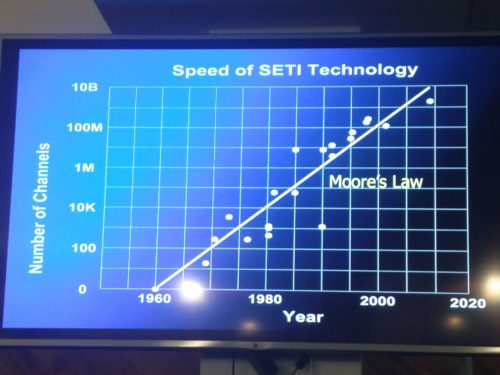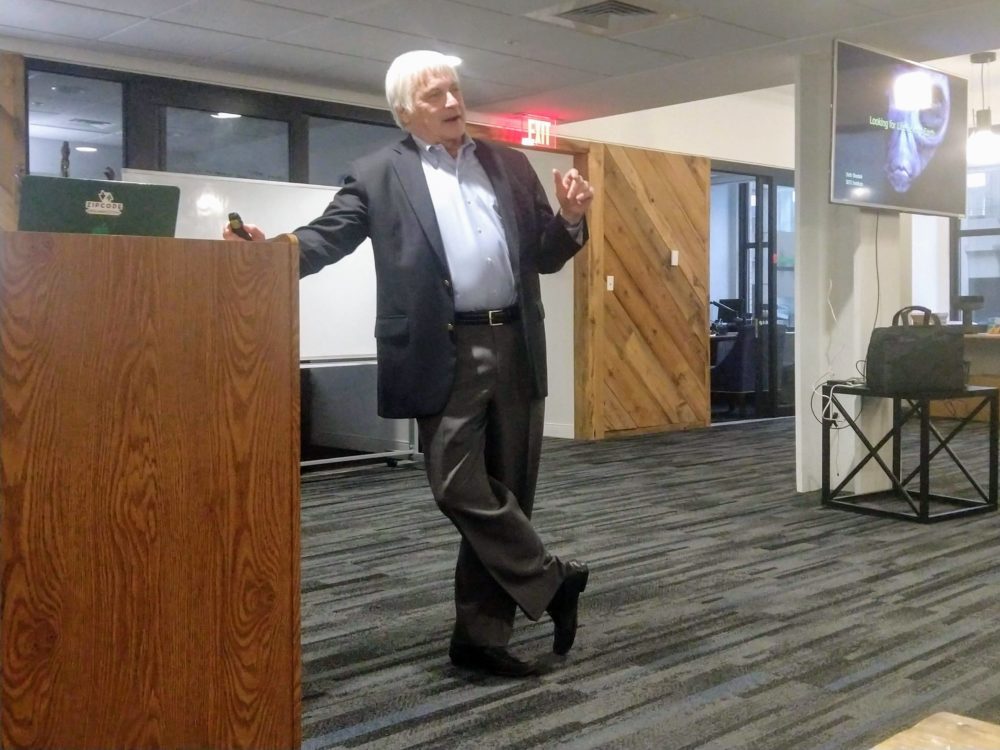If you’ve ever wondered whether a career in programming could lead to answering existential questions about the true nature of our universe for the masses, well, turns out yes, it could.
Zip Code Wilmington welcomed a special guest speaker on Monday: Seth Shostak, the director of research at Search for Extra-Terrestrial Intelligence (better known as SETI) Institute.
The privately funded nonprofit — contrary to popular belief, it is not funded by the U.S. government beyond periodic grants — has a mission to “explore, understand and explain the origin and nature of life in the universe and the evolution of intelligence,” often with radio signal searches for intelligent life in the universe.
Shostak believes that we could be just 15 to 20 years away from making first contact.
“From my point of view, there are a handful of really big questions,” said Ben du Pont, cofounder of Zip Code Wilmington, who arranged for a mini Delaware speaking tour by Shostak. “Why are we here? What happens when we die? Are we alone? Seth Shostak is one of the foremost experts in answering that question.”
Shostak, to be clear, is a scientist focusing on beings potentially living in far-off galaxies. He’s a doubter when it comes to alien abduction stories, and he doesn’t believe in ancient aliens.
“The ancient Egyptians built the Pyramids,” he said, flatly.
The existence of intelligent life forms (i.e. life forms that have evolved to the point of mass communication) in the universe, on the other hand, is an overwhelming statistical possibility.
“It’s a numbers game,” Shostak said. “There are 2 trillion galaxies in the known universe. Not stars — galaxies. Each star has the potential to have an ‘Earth,'” or an inhabitable planet.
“If you believe we’re alone, you believe you’re a miracle,” he said. “You parents may have told you you’re a miracle when you were 10, but that’s not a scientific conclusion.
Reminder: News of discovering a new planet or galaxy — something that is no longer an earth-shatteringly big deal to most people — was unheard of during the entire run of “Star Trek: The Next Generation.”
“Up until 1995, we didn’t know planets were common,” Shostak said.
Then there’s Moore’s Law, which says that processing power for computers will double every two years.

Seth Shostak’s presentation on Moore’s Law. (Photo by Holly Quinn)
That means the number of planets we’ll know about will likely increase exponentially, too. And SETI’s Allen Telescope Array in Northern California is essentially a big computer.
“Much of the software is written in Java,” Shostak said.
There’s also artificial intelligence and machine learning to consider.
“Machines can beat humans at just about anything,” said the scientist. In fact, it’s not inconceivable that an autonomous machine will be the first to connect with other intelligent life — or even with other artificial intelligence.
Which is all to say that coders — possibly using a version of the Java taught at Zip Code Wilmington — will likely be at the forefront of it all if or when humanity finds other intelligent life in the universe.
“They’re going to be in the middle of it,” Shostak said after the talk, motioning toward the socializing Zip Code alum in attendance.
Unfortunately, coding software for SETI isn’t lucrative like commercial coding jobs — at least, not yet.
Read more from Shostak:
- “‘Zoo hypothesis’ may explain why we haven’t seen any space aliens“
- “Why alien ‘megastructures’ may hold key to making contact with extraterrestrials“
Join the conversation!
Find news, events, jobs and people who share your interests on Technical.ly's open community Slack

Delaware daily roundup: Delmarva Power vendor stats; DelDOT's $15M federal grant; 50 best companies to work for

Delaware daily roundup: Over 4,000 Black-owned businesses uncovered; Dover makes rising cities list; a push for online sports betting

Delaware daily roundup: Ladybug Fest illuminates small biz; Hahnemann Hospital's biotech future; intl. politics and a Middletown project


